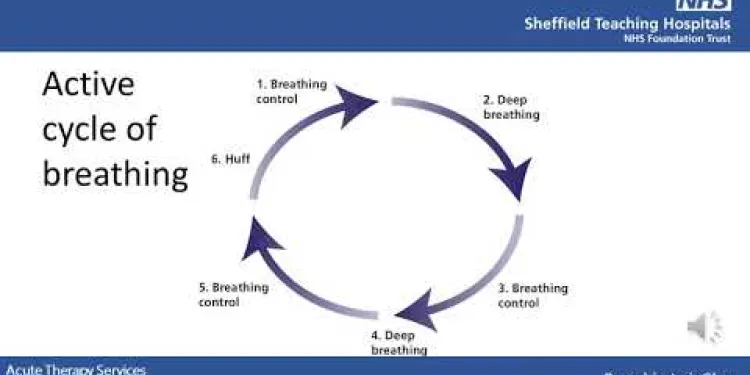Find Help
More Items From Ergsy search
-

Bronchiectasis Class
Relevance: 100%
-

Bronchiectasis class presentation v2
Relevance: 94%
-

Pulmonary rehabilitation | NHS
Relevance: 20%
-

Chest clearance techniques
Relevance: 19%
-

How often should one perform air physiotherapy?
Relevance: 13%
-

What equipment is used in air physiotherapy?
Relevance: 12%
-

NHSGGC - Respiratory Physiotherapy Service: Self-Management
Relevance: 7%
Understanding Bronchiectasis
What is Bronchiectasis?
Bronchiectasis is a long-term condition where the airways of the lungs become abnormally widened, leading to a build-up of excess mucus. This build-up increases the risk of lung infections. The condition can develop at any age but is more commonly diagnosed in older adults.Causes of Bronchiectasis
There are several factors that can contribute to the development of bronchiectasis. These include respiratory infections during childhood, immune system deficiencies, and conditions such as cystic fibrosis. It's essential to pinpoint the underlying cause to manage the disease effectively.Symptoms of Bronchiectasis
Common symptoms include a persistent cough that produces a large amount of sputum, breathlessness, recurring chest infections, and fatigue. Some individuals might also experience coughing up blood. These symptoms can significantly impact the quality of life if not managed properly.Diagnosis
Bronchiectasis is usually diagnosed through a combination of a patient's medical history, physical examinations, and imaging tests such as a high-resolution computed tomography (HRCT) scan. These tools help doctors visualize the condition of the lungs and the extent of the damage.Treatment Options
While there is no cure for bronchiectasis, treatments focus on managing symptoms and preventing further lung damage. Common treatments include inhaled medications, physiotherapy to help clear mucus from the lungs, antibiotics to treat infections, and sometimes surgery for severe cases.Managing Bronchiectasis
Living with bronchiectasis requires ongoing management and lifestyle adjustments. Patients are advised to stay active to improve lung function, maintain a balanced diet to boost the immune system, and avoid smoking and pollutants. Regular check-ups with a healthcare provider are also crucial to monitor the condition.Support and Resources
In the United Kingdom, various support networks and resources are available for individuals with bronchiectasis. The British Lung Foundation provides information and support, while specialised clinics offer targeted treatments. Effective management plans often involve a multidisciplinary team, including doctors, specialist nurses, and physiotherapists. Understanding bronchiectasis is crucial for those affected and their families. Comprehensive knowledge about the condition, its symptoms, and management strategies can significantly improve quality of life.Understanding Bronchiectasis
What is Bronchiectasis?
Bronchiectasis is when the tubes in your lungs get bigger than they should be. This can cause sticky mucus to build up in your lungs. Too much mucus can lead to lung infections. Anyone can get bronchiectasis, but it is more common in older people.Causes of Bronchiectasis
Several things can cause bronchiectasis. These include lung infections when you are young, a weak immune system, or a condition called cystic fibrosis. It is important to find out the cause to treat bronchiectasis properly.Symptoms of Bronchiectasis
Common symptoms are a cough that does not go away, bringing up a lot of mucus, feeling out of breath, having chest infections often, and feeling very tired. Some people may also cough up blood. These symptoms can affect how you feel every day.Diagnosis
Doctors find out if someone has bronchiectasis by looking at their medical history and doing physical check-ups. They may also use an imaging test like a special X-ray called a HRCT scan. This helps doctors see the lungs better.Treatment Options
There is no cure for bronchiectasis, but treatments can help manage it. These treatments might include medicine you breathe in, exercises to clear mucus from your lungs, antibiotics for infections, and sometimes surgery if it's very bad.Managing Bronchiectasis
People with bronchiectasis need to manage it every day. Staying active helps your lungs work better. Eating healthy food helps your immune system stay strong. It is important not to smoke and to avoid dirty air. Regular doctor visits are needed to keep an eye on your lungs.Support and Resources
In the United Kingdom, there are groups that can help people with bronchiectasis. The British Lung Foundation gives information and help. There are also special clinics for treatment. A care team usually includes doctors, nurses, and physiotherapists. Learning about bronchiectasis helps you and your family. Knowing what it is, what symptoms to look for, and how to manage it can make life better.Frequently Asked Questions
What is bronchiectasis?
Bronchiectasis is a long-term condition where the airways of the lungs become abnormally widened, leading to a build-up of excess mucus that can make the lungs more vulnerable to infection.
What are the common symptoms of bronchiectasis?
Common symptoms include a persistent cough, coughing up large amounts of mucus, shortness of breath, chest pain, and frequent lung infections.
How is bronchiectasis diagnosed?
Bronchiectasis is typically diagnosed through a combination of medical history, physical examination, chest X-rays, CT scans, and lung function tests.
What causes bronchiectasis?
Bronchiectasis can be caused by a variety of factors including infections (like pneumonia or tuberculosis), genetic conditions (such as cystic fibrosis), and other lung conditions. Sometimes, the cause is unknown.
Is bronchiectasis a common condition in the UK?
Bronchiectasis is not extremely common but is recognized as a significant health issue in the UK, especially among older adults.
Can bronchiectasis be cured?
Currently, bronchiectasis cannot be cured, but treatments can help manage symptoms and improve quality of life.
What treatments are available for bronchiectasis?
Treatments include airway clearance techniques, chest physiotherapy, medications (such as antibiotics, bronchodilators, and corticosteroids), and in some cases, surgery.
How can I manage bronchiectasis on a daily basis?
Daily management includes regular chest physiotherapy, taking prescribed medications, staying hydrated, avoiding smoking, and getting vaccinated against influenza and pneumonia.
Can exercise help with bronchiectasis?
Yes, regular exercise can help improve lung function, enhance mucus clearance, and improve overall well-being. It’s important to consult with a healthcare provider for an appropriate exercise plan.
Are there any dietary changes that can help manage bronchiectasis?
Maintaining a balanced diet to support overall health and staying hydrated can be beneficial. Some people may benefit from a high-calorie diet if they are underweight due to the condition.
Can children develop bronchiectasis?
Yes, children can develop bronchiectasis, particularly if they have had severe lung infections or have underlying conditions such as cystic fibrosis.
What complications can arise from bronchiectasis?
Complications can include recurrent lung infections, respiratory failure, and in severe cases, heart failure related to the lung disease.
How often should I see a healthcare provider if I have bronchiectasis?
Regular follow-up appointments with a healthcare provider are important for managing the condition. The frequency will depend on the severity of your condition and how well it is controlled.
Is bronchiectasis contagious?
No, bronchiectasis itself is not contagious. However, respiratory infections that can trigger or worsen bronchiectasis can be contagious.
How does smoking affect bronchiectasis?
Smoking can significantly worsen bronchiectasis by irritating the airways, increasing mucus production, and making the lungs more susceptible to infections.
What is bronchiectasis?
Bronchiectasis is when the tubes in your lungs get wider and damaged. This makes it hard to breathe.
If you have trouble reading, use tools like a screen reader or ask someone to read it with you.
Bronchiectasis is a health problem that lasts a long time. It happens when the tubes in your lungs get bigger than normal. This can cause sticky stuff, called mucus, to build up. This makes it easier for germs to make you sick.
Tip: If reading is tough, try using a reading ruler or listening to audiobooks to help understand better.
What signs show someone might have bronchiectasis?
Bronchiectasis is when your airways (the tubes that carry air in and out of your lungs) get damaged. Here are some signs that someone might have it:
- Coughing: You might cough a lot and there could be mucus.
- Breathlessness: You might find it hard to breathe or feel out of breath often.
- Tiredness: You might feel very tired or have less energy than usual.
- Chest infections: You might get chest infections often.
- Noisy breathing: Breathing might sound wheezy or crackly.
To help understand these signs, you can try these tools:
- Pictures: Use pictures to help explain the signs.
- Talk to someone: Discuss with a doctor or someone who can help explain things to you.
Some signs you might notice are:
- A cough that won't go away.
- Coughing up a lot of thick spit.
- Finding it hard to breathe.
- Pain in your chest.
- Getting lung infections often.
If reading is hard, you can:
- Use audiobooks to listen instead of read.
- Ask someone to read things out loud to you.
- Use apps that read text aloud.
- Take breaks and read slowly, a bit at a time.
How do doctors find out if someone has bronchiectasis?
Doctors find out if someone has bronchiectasis by asking about their health history, checking them with a physical exam, taking chest X-rays, doing CT scans, and testing how well their lungs work.
What makes bronchiectasis happen?
Bronchiectasis happens when the tubes that carry air to your lungs get damaged. This damage makes it hard to breathe. Some reasons this happens are:
- Having lots of lung infections.
- Being born with a problem in your lungs.
- Other illnesses that affect your lungs.
If you have trouble understanding this, you can:
- Ask a grown-up or a doctor to explain it.
- Look at pictures or videos that show how the lungs work.
Bronchiectasis happens when the tubes in your lungs get damaged. This can happen because of:
- Infections like pneumonia or tuberculosis.
- Genetic problems like cystic fibrosis that you are born with.
- Other lung problems.
- Sometimes, we don't know why it happens.
If reading is hard, try reading with a friend or using an audio reader to listen to the text.
Is bronchiectasis a common condition in the UK?
Bronchiectasis is not very common in the UK.
To understand more about it, you can:
- Ask your doctor to explain.
- Use pictures to help understand.
- Watch videos about bronchiectasis.
Bronchiectasis is a lung problem. It's not very common, but it is important to know about it in the UK. It mostly affects older people.
Here are some tips to help understand this better:
- Break big words into smaller parts. For example, say "bron-chi-ec-ta-sis".
- Use a dictionary for hard words.
- Ask someone for help if you are unsure.
Can bronchiectasis be fixed?
Bronchiectasis is a lung problem. It makes it hard to breathe. Doctors can't always make it go away. You can speak with your doctor to learn how to feel better. Breathing exercises and medicine can help.
Right now, we can't make bronchiectasis go away completely. But doctors can help make it better with treatments. These treatments can help you feel better and live a nicer life.
What treatments can help with bronchiectasis?
Bronchiectasis is a lung problem. It makes your breathing tubes wider than normal. Here are some ways to help:
- Medicine: Doctors might give you medicine to help you breathe better and fight infections.
- Physiotherapy: This is like special exercises to clear your lungs and make breathing easier.
- Inhalers: These are small devices that give you medicine when you breathe in.
- Stay healthy: Eating well and staying active can help you feel better.
If you have questions, ask a doctor or nurse. They can help you understand more.
Treatments help you breathe better. These can be:
- Ways to clear your airways
- Exercises for your chest
- Medicines like antibiotics, bronchodilators, and corticosteroids
- Sometimes, you might need surgery
Helpful tools:
- Use pictures or videos to understand better
- Ask someone to explain things in a simple way
How can I take care of my bronchiectasis every day?
Every day, it is important to do some things to stay healthy.
- Do chest exercises. This helps you breathe better.
- Take your medicine. Your doctor will tell you what to take.
- Drink lots of water. It helps your body stay strong.
- Do not smoke. Smoking is bad for your lungs.
- Get your flu and pneumonia shots. These shots stop you from getting sick.
If you find reading hard, try using audio books or apps that read text out loud. They can help you understand better.
Does exercise help if you have bronchiectasis?
Exercise can be good for people with bronchiectasis. It can help you breathe better and make you feel stronger.
Here are some tips:
- Talk to your doctor before starting any exercises.
- Start slow and do a little bit every day.
- You can do simple exercises like walking or stretching.
Some tools can help, like watching exercise videos or using a step counter to see how much you walk. Always listen to your body, and if you feel tired, take a break.
Yes, doing exercise often can help your lungs work better. It can also help clear mucus from your lungs and make you feel better. It is important to talk to a doctor to get the right exercise plan for you.
Can changing what you eat help with bronchiectasis?
There are ways your food can help with bronchiectasis.
Eating healthy food can make you feel better.
Here are some tips to help:
- Eat lots of fruits and vegetables.
- Drink plenty of water.
- Try to eat foods with less salt and sugar.
- Get enough protein, like from beans, chicken, or fish.
- Avoid foods that make you feel bad.
Use a diary to write down what you eat.
Talk to your doctor or a dietitian. They can help you choose the best foods.
Eating healthy food is good for your body. Drinking water is important too. If someone is very thin because they are sick, eating more food with lots of calories can help them.
Can children get bronchiectasis?
Yes, children can get bronchiectasis. Bronchiectasis is when lungs get damaged, and it is hard to breathe. If a child keeps getting chest infections, it can cause bronchiectasis.
If you think a child has trouble breathing or gets sick a lot, it is important to see a doctor. They can help find out what is wrong and how to make it better.
Using pictures can help children understand. Also, talking in a calm and simple way can make it easier for them.
Yes, kids can get bronchiectasis. This can happen if they have had bad lung infections or have conditions like cystic fibrosis.
What problems can happen because of bronchiectasis?
Bronchiectasis is a lung sickness. It can cause problems, like:
- Harder to breathe
- Lungs get sick more often
- Feeling very tired
- Coughing a lot
- Coughing up sticky stuff or blood
If you have bronchiectasis, talk to a doctor. They can help you feel better. Using pictures, simple words, and sounds can help make it easier to learn about this. Ask someone you trust to read with you and explain things.
Sometimes, problems can happen. These can be getting sick in the lungs again and again, having trouble breathing, and if it gets very bad, the heart might also have trouble because the lungs are sick.
It can help to talk to a doctor, take medicine, and use breathing tools. These steps can make breathing easier and help you stay healthy.
How often should I visit a doctor if I have bronchiectasis?
If you have bronchiectasis, it is important to see your doctor.
Here are some tips to help you know when to go:
- Visit your doctor regularly for check-ups. Ask your doctor how often you need to come.
- If you feel more sick than usual, see your doctor sooner.
- Write down any symptoms you have. This can help you remember what to tell your doctor.
- Bring a family member or friend to your visit. They can help you remember what the doctor says.
If you need help reading this, ask someone you trust to read it with you.
It is important to have regular check-ups with your doctor. This helps to manage your health. How often you need to go depends on how serious your illness is and how well you are feeling.
Can you catch bronchiectasis from someone else?
No, you can't catch bronchiectasis from someone else. But, some lung infections that make bronchiectasis worse can spread from person to person.
How does smoking affect bronchiectasis?
Smoking can make lung problems worse.
It can cause more coughing and mucus.
Smoking makes it hard to breathe well.
It's good to stop smoking to help your lungs.
Ask a doctor or nurse for help to quit smoking.
Smoking is bad for bronchiectasis. It can irritate your breathing tubes, make more mucus, and cause more lung infections.
Useful Links
This website offers general information and is not a substitute for professional advice.
Always seek guidance from qualified professionals.
If you have any medical concerns or need urgent help, contact a healthcare professional or emergency services immediately.
Some of this content was generated with AI assistance. We’ve done our best to keep it accurate, helpful, and human-friendly.
- Ergsy carfully checks the information in the videos we provide here.
- Videos shown by Youtube after a video has completed, have NOT been reviewed by ERGSY.
- To view, click the arrow in centre of video.
- Most of the videos you find here will have subtitles and/or closed captions available.
- You may need to turn these on, and choose your preferred language.
- Go to the video you'd like to watch.
- If closed captions (CC) are available, settings will be visible on the bottom right of the video player.
- To turn on Captions, click settings .
- To turn off Captions, click settings again.
More Items From Ergsy search
-

Bronchiectasis Class
Relevance: 100%
-

Bronchiectasis class presentation v2
Relevance: 94%
-

Pulmonary rehabilitation | NHS
Relevance: 20%
-

Chest clearance techniques
Relevance: 19%
-

How often should one perform air physiotherapy?
Relevance: 13%
-

What equipment is used in air physiotherapy?
Relevance: 12%
-

NHSGGC - Respiratory Physiotherapy Service: Self-Management
Relevance: 7%

